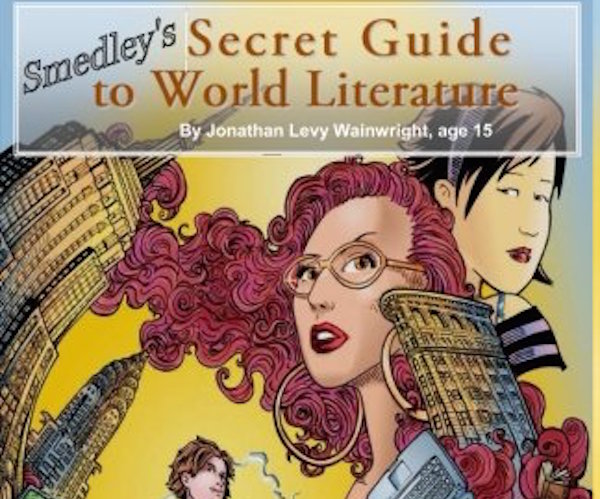Book Review: “Smedley’s Secret Guide to Literature” — Teenage Lit-Land
This savvy, witty, and casually erudite novella proves that when it comes portraying adolescence in fiction the less sentimentality the better.
Smedley’s Secret Guide to World Literature by Askold Melnyczuk. PFP, 254 pages, $14.95.

By Matt Hanson
Early on in Smedley’s Secret Guide to World Literature we’re introduced to our winsome narrator Jonathan Levy Wainwright, age 15, who makes his attitude towards the reader sparklingly clear: “If any reader still thinks this is going to be a coming of age story, I’d like to say right away: pluck your head from your ass! Nobody comes of age anymore.” He’s right, of course, and is just as correct to assert it as Holden Caulfield was in consciously avoiding “all that David Copperfield kind of crap” when he told the story of his own life so far.
It’s not just that young people grow up much faster than they did in generations past; it’s also that the meaning of adulthood has lost much of its traditional authority, especially considering the current state of the world. Millennials are often accused of being blissfully ignorant of anything outside of their Ipods and laptops, but Jonathan crushes this stereotype for the cultural condescension it is: “I don’t know how else to say what I really want to ask: like, how can these “grown-ups” think it’s okay to do what they do to us? September 2001, I wasn’t even ten. But we’ve been bombing people most of my life because of what happened that day. And that’s the world of the grown-ups.” So there.
Geo-political tensions notwithstanding, our perceptive hero has problems of his own. Askold Melnyczuk’s story begins as Jonathan is serving a week-long suspension from school after a waterboarding prank gone awry (it’s a long and somewhat odd story) and discovers that his casual girlfriend may be pregnant with his child, a predicament only compounded by needing to care for his stroke-felled godfather in New York City.
In an effort to focus his son’s hyperactive mind, and to impart some sagely wisdom onto his son, Jonathan’s Cambridge academic father challenges him to write a unique and personal history of world literature that focuses on some of the more obscure figures in world literature. This adds a layer of historical depth to the otherwise first person narrative, giving Jonathan a richer, more mature intellectual life while bringing the reader’s attention to overlooked figures such as Medford’s own novelist and abolitionist Lydia Maria Child, most famous for writing the poem “Over the River and Through the Woods” that became a popular Christmas carol.
But what appeals to Jonathan isn’t just the history of a corny yuletide chestnut; it’s the fact that Child was a rabble-rousing abolitionist who insisted on total emancipation of all African slaves all the way back in 1820. “In the old days, literature was a lot more like punk.” Jonathan also adds appreciative entries for the great Indian sage Rabindranath Tagore, activist and author Melvin Tolson, and the Missouri-born proto-feminist activist Agnes Smedley, a part Native American woman who, as the kid describes it, “had megaballs and Angelinalips.”
Some of the entries are disappointingly brief, with Jonathan skipping over some of the more important details as he picks his own narrative back up. It’s a missed opportunity that weakens the book as a whole, since we only glimpse compelling figures for a moment. Both Jonathan as a character and the details of his story would have benefited from a more thorough examples of his irreverent style of literary scholarship.
As a character, Jonathan has the all the snarky confidence of a bright young man but he resists falling into the Peter Pan trap since he is, like most of his real life peers, knowingly immersed in the more complex, humbling questions of adulthood. To his credit, Melnyczuk captures the hyperbolic pitch of the voice of today’s teenagers. At times, Jonathan might be a little too cocky on the surface, but it’s easy to see that there’s a sensitive and inquisitive mind budding under all his teenage bravado. It may be a bit thin regarding its celebration of literature, but this savvy, witty, and casually erudite novella proves that when it comes portraying adolescence in fiction the less sentimentality the better.
Matt Hanson is a critic for The Arts Fuse living outside Boston. His writing has appeared in The Millions, 3QuarksDaily, and Flak Magazine (RIP), where he was a staff writer. He blogs about movies and culture for LoveMoneyClothes. His poetry chapbook was published by Rhinologic Press.
